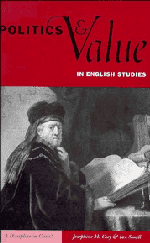3 - Authority and value
Published online by Cambridge University Press: 27 January 2010
Summary
Current debates about the status or authority of English and literary studies have at their centre a controversy about the nature and function of value in literary judgements. Indeed a dissatisfaction with the value-judgements embodied in ‘traditional’ literary criticism has been the point of departure in programmes for reforming the discipline. A critique of value, that is, provides the fundamental rationale for change. We have argued that these programmes for reform in both Britain and the United States take no account of the general conditions (intellectual and social) for the establishment of disciplines of knowledge. A more fundamental question is whether or not such reforms are needed in English studies in the first place; or rather, whether the critiques of value which underwrite proposals for reform are themselves valid.
There are two main issues involved. The first concerns the correctness of the description of the values allegedly embodied in English – more specifically, the claim that all literary judgements are value-judgements, and that all value-judgements in English are ideological or political. Our suggestion will be that literary judgements are indeed value-laden, but that they also have a basis in fact, and the values which they embody are not simply ideological. The second issue is whether the presence of value-judgements in English (or literary) disciplines is a justification for reforming them. How does English compare with other disciplines of knowledge in respect of its value-judgements?
- Type
- Chapter
- Information
- Politics and Value in English StudiesA Discipline in Crisis?, pp. 68 - 98Publisher: Cambridge University PressPrint publication year: 1993



